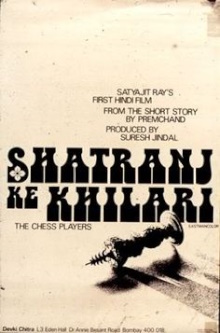This film by Satyajit Ray feels utterly different from his other works yet we loved it just the same. I understand that this is the only one of the director’s body of work made in the Hindi language and indeed this one deals with the fate of an entire kingdom, the state of Awadh. I kept expecting the two parallel storylines to converge at some point but I suppose this is part of the joke as the film is all about recounting a historical tragedy with a powerfully incisive sense of humor.
In 1856, the British resident at Lucknow Sir James Outram decides to annex Awadh and ask the king to abdicate, citing maladministration as his justification. Indeed the king Wajid Ali Shah is a poet, singer, and patron of the arts in other ways but there is no widespread dissatisfaction against his rule. Meanwhile two of the noblemen in the kingdom Mirza Sajjad Ali and Mir Roshan Ali are engrossed in daily games of chess against each other. Both of them are descendants of great warriors of the past but today take pleasure in an indolent life and do all of their fighting on the chessboard while their weapons hang as decorations on their walls. Mirza’s wife is upset that he is neglecting her and even tries hiding the chess pieces. When they go to Mir’s house to play instead, it turns out that Mir’s is actually having an affair while he is frequently absent. Both are willfully blind to their own domestic problems and insist on carrying on with their chess games, even as Wajid Ali Shah wrestles with whether or not to deploy his own soldiers to oppose the invading British forces.
All of the other films by Ray that we’ve watched so far date from much earlier so it’s not surprising that this is so different in style and is even in color. It really is just as brilliant as the others though I was confused for a while that the two parallel stories never intersect. The scenes with the British resident and the king of Awadh are played completely straight and it’s so impressive that Ray got Richard Attenborough to play Sir James. He exudes the same kind of arrogance and superiority that we’ve seen so many times before. Yet it also includes British characters like Captain Weston who speak Hindi perfectly and actually appreciates Urdu poetry, yet still unhesitatingly carries out Sir James’ unethical orders. Meanwhile the story about the two chess players is laugh out loud funny as the two are obsessed with playing their game in peace no matter what. The historic moment of their kingdom falling into British hands therefore passes almost unnoticed by the pair as even a child knows more about what is going on.
I half expected the two chess players to be somehow able to forestall the British using some brilliant strategy but that sort of miraculous happy ending doesn’t belong in a film by Ray. In the modern era, the British colonizers are deservedly the villains in Indian cinema. Here Sir James is still the villain but the real target of the director’s ire here is the complacency and indolence of the Indian ruling class. Their forefathers may have shed blood to establish the kingdom but these descendants are too attached to their creature comforts and familiar daily rituals to lift a finger to stop the British. At the same time, he doesn’t hold back on the hypocrisy of the English as Sir James himself admits that the actions of East India Company are unethical and that the annexation is a done deal regardless of wishes of Wajid Ali Shah. He cites the king’s lack of interest in administrating the state to justify their actions but also looks forward to the increasing the number of subjects brought under the dominion of the British Queen and the income to be added to the Crown.
The Apu series has been rather sad throughout so it’s quite refreshing that the main draw here is how funny it is. There’s very little harsh excoriation in this film despite the tragedy of the events depicted and Ray’s obvious strong feelings on the matter. Instead he chooses to play up the comical aspects of the situation to mock the historical personages involved. This makes it a far more effective and memorable critique than an outright condemnation would be.
